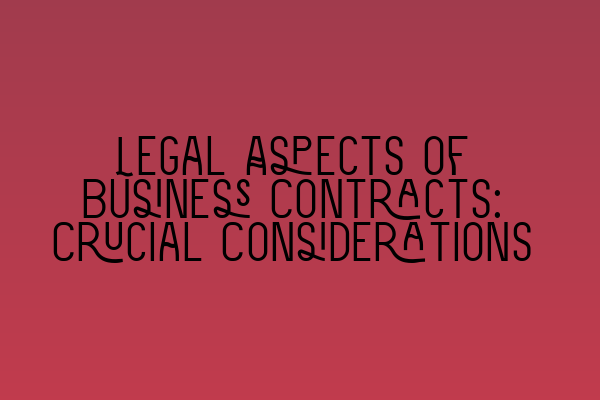Legal Aspects of Business Contracts: Crucial Considerations
Welcome to our blog post on the legal aspects of business contracts. In today’s competitive business landscape, contracts play a crucial role in protecting the interests of individuals and organizations alike. Whether you are a startup founder, a small business owner, or a corporate executive, it is vital to understand the key legal considerations when entering into contracts.
1. Clear and Precise Contract Terms
One of the most important aspects of any business contract is the clear and precise definition of its terms. Ambiguity in contract language can lead to misunderstandings and disputes down the line. It is essential to consult with a qualified contract solicitor to ensure that your contract terms are unambiguous and accurately reflect the intentions of all parties involved.
For example, if you are looking to draft a contract for the sale of goods, make sure to clearly specify the quantity, quality, and price of the goods in question. In case of any breach of contract, these well-defined terms will make it easier to enforce your rights or seek appropriate remedies.
2. Consideration and Mutuality
Another crucial consideration in business contracts is the concept of consideration. Consideration refers to something of value that each party to a contract agrees to provide or exchange. It is important to ensure that both parties receive some form of consideration, as contracts lacking mutuality may be deemed unenforceable by a court of law.
For instance, if you are entering into a partnership agreement, you and your partner should clearly outline the contributions each of you will make to the business, such as capital, services, or expertise. This mutual exchange of considerations will not only provide certainty but also avoid any potential disputes in the future.
3. Legal Capacity of Parties
Before entering into a business contract, it is essential to verify that all parties involved have the legal capacity to enter into such agreements. This means ensuring that they are of legal age, mentally sound, and not under any other legal restrictions that may prevent them from entering into a binding contract.
For example, if you are considering entering into a contract with a minor, such as an employment agreement or a lease, you may need to obtain the consent of their parent or guardian to make the contract legally enforceable. Failure to do so may render the agreement voidable or unenforceable.
4. Compliance with Legal Formalities
Contracts are subject to specific legal formalities that must be followed for them to be valid and enforceable. These formalities may vary depending on the type of contract and the jurisdiction in which it is being executed.
For instance, certain contracts, such as those involving the sale of land or real estate, may need to be in writing and signed by all parties involved. Failure to comply with these formalities may render the contract unenforceable or lead to unnecessary legal complications.
5. Appropriate Dispute Resolution Mechanisms
In the event of a contract dispute, having appropriate dispute resolution mechanisms in place can save parties time, money, and unnecessary stress. Consider including alternative dispute resolution (ADR) methods, such as negotiation, mediation, or arbitration, in your contracts.
These mechanisms can help parties resolve their disputes amicably and efficiently, without resorting to costly and time-consuming litigation. Consult with a contract solicitor to determine the best dispute resolution mechanisms for your specific business needs.
Conclusion
Understanding the legal aspects of business contracts is essential for any individual or organization looking to protect their rights and interests. By ensuring clear and precise contract terms, considering the mutuality of considerations, verifying the legal capacity of parties, complying with legal formalities, and implementing appropriate dispute resolution mechanisms, you can mitigate potential risks and conflicts.
If you need further guidance on drafting or reviewing business contracts, don’t hesitate to consult with a contract law solicitor. They can provide expert advice specific to your situation and help you navigate the complexities of contract law.
For additional resources on legal exams and preparation courses, check out the following links:
